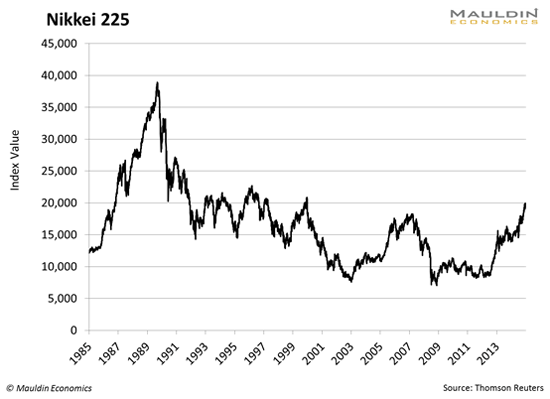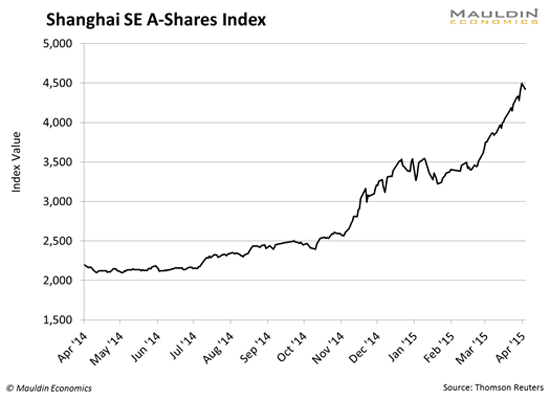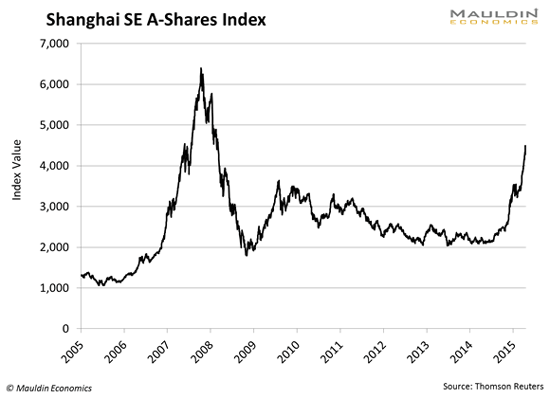The 10th Man: Pascal’s Wager
By Jared Dillian
Do you believe in God? Whoa, wait a minute, this is an investment newsletter, right?
Stay with me.
I’m an armchair philosopher, and I’ve always wished I’d had the opportunity to be a philosophy major, because I can navel gaze with the best of them. But since then, I’ve come to know some actual philosophy professors, and as it turns out, they tend to not get along with other philosophy professors, which makes departmental politics a little toxic.
I can’t remember exactly when it was that I learned about Pascal’s Wager. 17th-century French philosopher Blaise Pascal postulated that
it is rational behavior to believe in God.
Why believe in something for which there is no evidence? The answer lies in decision theory.
If you believe in God and you’re right, you go to heaven. Let’s call this “infinite gain.”
If you believe in God and you’re wrong, the only thing you lose is whatever time you spent in church and/or money you donated. It’s a finite loss.
If you don’t believe in God and you’re right, there is no God, you get to be smug. That is a finite gain.
If you don’t believe in God and you’re wrong, you go to hell. Let’s call this infinite loss.
Here it is in table format:
I think most people who understand decision theory will recognize this immediately. So yes, it is indeed rational—meaning in our best interest—to believe in God.
As it turns out, Pascal’s Wager is all over the place in markets.
Best example: Japan in 2012.
There’s this new prime minister, Abe, and this new Bank of Japan governor, Kuroda. They’re going to do this thing called Abenomics. They say they want to print trillions of yen to buy all kinds of assets, which is going to reflate the markets and devalue the currency.
Now ever since the crash of the early 1990s, Japan has had numerous plans to get out of deflation. Japan being Japan, not much changes there, and they end up just getting bogged down in bureaucracy. This has happened at least a dozen times in the last 20 years. So why believe them this time?
Table again:
Boy, did some people have to learn this the hard way. For the record, I’m still long the WisdomTree Japan Hedged Equity Fund (DXJ) and short the yen (JPY) 2.5 years later. I’m still in the trade because it’s the only trade in the markets that literally has infinite upside.
The people who were yelling at me that Japan was going to zero have a lot in common with the very vocal atheists you see on Facebook. They have an overwhelming desire to be right all the time. I don’t care if I’m right—I just want to make money!
The Nikkei went from 40,000 to 8,000. If it goes from 8,000 to 7,000, I make 12.5%. If it goes from 8,000 to 20,000 (which it just did), that’s a 150% gain. But some people like to say, “I told you so.” It’s worth more to them than money.
I will also point out that if you’re short, the most you can make is 100%, but if you’re long, there’s no limit to how much you can make. It’s hard work being a short investor. I wouldn’t run a dedicated short fund no matter how much you paid me. I’d rather pump gas.
Belief and the Black Box
I don’t think anybody really understands China. I think even the people who say they understand China don’t understand China.
How can you understand China? It’s a black box spitting out bogus economic statistics. 7% GDP? We all know they were in recession.
Two things you need to know about China:
- They are very capitalist. Way more than us. It’s the new land of opportunity. There are surveys showing this.
- They really want someone to organize society. The Chinese people just aren’t into spontaneous order.
This is a new thing in the 21st century. We’re learning that it’s possible to be capitalist in the context of a command-and-control government.
Now, as recently as 2008, I believed this would never work. Capitalism, I thought, was incompatible with planning. The Chinese went and borrowed a ton of money to build ghost cities they plan to move 300 million people into. If we tried this here in America, it would be a disaster. We can’t even build a subway line on Second Avenue.
So back in March 2013, that 60 Minutes piece on China’s ghost cities got investors really nervous—and ever since then, people have been waiting for the debt bomb to blow up.
But as I said, it’s a black box.
Everyone knows what happened next: the fake economic data started getting worse, commodities markets crashed, and people were speculating that China pulled forward demand for things like steel and iron ore 50 years.
But then, abruptly:
The market went up 20% in a matter of weeks. And then, in unison, the financial media said: It’s a bubble!
I found that odd. Usually when something goes up 20%, it’s not a bubble, especially in the context of the longer-term chart.
So remember, nobody understands China. It’s a black box. There’s no way to tell if it’s a bubble or not.
Pascal’s Wager again:
Needless to say, I’m long China A-shares, through the Market Vectors ChinaAMC A-Share ETF (PEK).
In general, there is more money to be made believing in things than not believing in things.
But aren’t we taught to be skeptical? What about Enron? Or Lehman?
There’s a time for that too, but trades like that always seem to happen in bear markets (because in bull markets, nobody asks the hard questions). So it’s situational.
I hate China. Absolutely hate it. I think it’s smoke and mirrors. It’s all going to blow up someday. But I look at the chart, and I change my mind.
China is fixed.
They’re going to pull it off.
Bull market again.
I love China.
I will believe pretty much whatever you want me to believe as long as I think I can make money off it.
Jared Dillian







